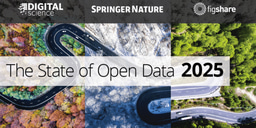Virtual Event 30th October: Marine Forests in the Anthropocene, presented by Prof. Sergio Rossi
Published in Earth & Environment and Ecology & Evolution

Explore the Research
 Cassyni
Cassyni
Marine Forests in the Anthropocene
Human activities, combined with global changes, are placing immense and unsustainable pressures on marine ecosystems, particularly coasta…
Date: 📅 Wednesday 30th October 2024
Time: ⏰ 17:30 PM CET | 12:30 AM EDT | 16:30 PM BST
Sign up here if interested: https://cassyni.com/events/BiBBkAeotiPYduFeuzHzZj
The event will also be recorded, so even if you cannot follow it live, you'll still be able to watch the recording which will be circulated to those who have signed up.
Abstract: Human activities, combined with global changes, are placing immense and unsustainable pressures on marine ecosystems, particularly coastal and deep-sea environments. These changes, though complex and gradual, are often perceived as adaptations to social and economic needs rather than as significant disruptions. Marine Animal Forests ('MAFs'), which are large, diverse, three-dimensional structures in the ocean, play a vital role in maintaining marine biodiversity and serving as carbon sinks. MAFs, composed of various organisms like sponges and corals, act as ecosystem engineers, shaping hydrodynamics, nutrient flows, and supporting biodiversity. Crucially, they also contribute to the global carbon cycle through carbon capture and storage.
However, MAFs are in decline due to environmental degradation, leading to the loss of their complex structures and ecosystem services. To reverse this, destructive practices must be halted, with data-driven evidence showing how such activities harm both the environment and human societies. This shift requires new frameworks and sustainable management practices that engage multiple stakeholders and integrate citizen participation. Large-scale restoration of MAFs will depend on education, community involvement, and adaptive ecological approaches that respond to the rapid changes happening in the ocean.
Speaker: Sergio Rossi is a research scientist specializing in marine natural resources and biological oceanography. He is Professor at LABOMAR at the Universidade Federal do Cearà and at the DiSTeBA, Dipartimento di Scienze e Tecnologie Biologiche ed Ambientali, in the Università del Salento,. His lines of research are related with Marine Biodiversity and Global Change impacts in Marine Animal Forests and can be synthesized as: 1) Studying the role of environmental and biological factors of the water column on the distribution, nutritional condition and survival of benthic organisms to increase the knowledge and tools for coastal management. 2) Studying the physiology and trophic ecology of benthic in front of global change. 3) Underwater mapping and distribution of benthic suspension feeders through remote and deep diving techniques (Remotely Operated Vehicle (ROV) to understand energy fluxes in the benthos, carbon immobilization role of the benthic suspension feeders and the anthropogenic impacts on benthic populations. 4) Conservation and restoration research on marine biodiversity in coastal areas. 5) Marine ecosystem services and environmental education, studying aspects of natural ecosystem and resource management. Lastly, but just as important, his job as a scientific journalist, reflected in his collaborations with several journals and magazines, demonstrates his strong commitment with scientific outreach (also reflected in eco-thrillers and books for kids). He has described and promoted the Marine Animal Forest concept, extensively explained in two different Springer-Nature books (“Marine Animal Forests: the ecology of benthic biodiversity hotspots”, 2017 and “Perspectives on the Marine Animal Forests of the world”, 2020), and now part of the IUCN biome description. Oceans in decline (2019, Springer-Nature, Copernicus series) and A journey in Antarctica (2022, Springer-Nature, Praxis series) are two examples of his efforts to communicate science to a wide audience in a rigorous, but easily comprehensible way.
Q&A: The presentation will be followed by a Q&A session chaired by individuals from SDG14 working group, Judith Terpos and Greta Hedley-Miller, with the opportunity for you to ask questions.
We look forward to welcoming you on 30 October.




Please sign in or register for FREE
If you are a registered user on Research Communities by Springer Nature, please sign in